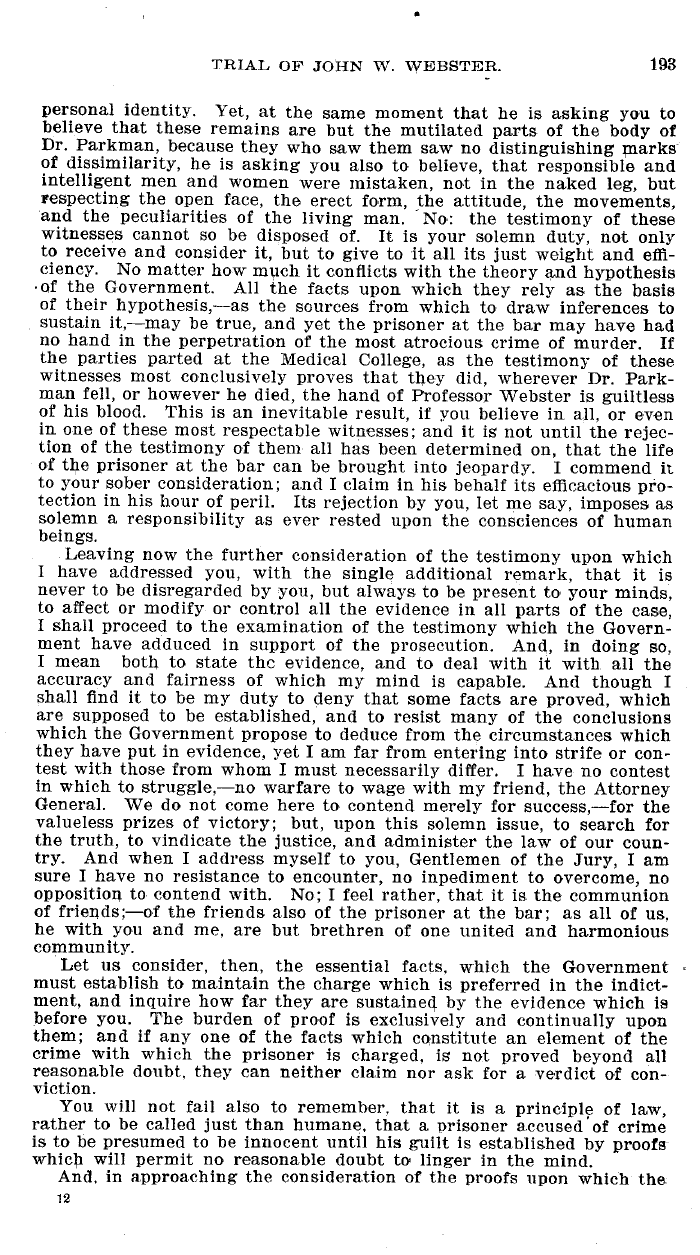|
TRIAL OF JOHN W. WEBSTER. 193
personal identity. Yet, at the same moment that he is asking you to
believe that these remains are but the mutilated parts of the body of
Dr. Parkman, because they who saw them saw no distinguishing marks
of dissimilarity, he is asking you also to believe, that responsible and
intelligent men and women were mistaken, not in the naked leg, but
respecting the open face, the erect form, the attitude, the movements,
and the peculiarities of the living man. - No: the testimony of these
witnesses cannot so be disposed of. It is your solemn duty, not only
to receive and consider it, but to give to it all its just weight and effi-
ciency. No matter how much it conflicts with the theory and hypothesis
of the Government. All the facts upon which they rely as the basis
of their hypothesis,-as the sources from which to draw inferences to
sustain it, may be true, and yet the prisoner at the bar may have had
no hand in the perpetration of the most atrocious crime of murder. If
the parties parted at the Medical College, as the testimony of these
witnesses most conclusively proves that they did, wherever Dr. Park-
man fell, or however he died, the hand of Professor Webster is guiltless
of his blood. This is an inevitable result, if you believe in all, or even
in one of these most respectable witnesses; and it is not until the rejec-
tion of the testimony of them all has been determined on, that the life
of the prisoner at the bar can be brought into jeopardy. I commend it
to your sober consideration; and I claim in his behalf its efficacious pro-
tection in his hour of peril. Its rejection by you, let me say, imposes as
solemn a responsibility as ever rested upon the consciences of human
beings.
Leaving now the further consideration of the testimony upon which
I have addressed you, with the single additional remark, that it is
never to be disregarded by you, but always to be present to your minds,
to affect or modify or control all the evidence in all parts of the case,
I shall proceed to the examination of the testimony which the Govern-
ment have adduced in support of the prosecution. And, in doing so,
I mean both to state the evidence, and to deal with it with all the
accuracy and fairness of which my mind is capable. And though I
shall find it to be my duty to deny that some facts are proved, which
are supposed to be established, and to resist many of the conclusions
which the Government propose to deduce from the circumstances which
they have put in evidence, yet I am far from entering into strife or con-
test with those from whom I must necessarily differ. I have no contest
in which to struggle,-no warfare to wage with my friend, the Attorney
General. We do not come here to contend merely for success,-for the
valueless prizes of victory; but, upon this solemn issue, to search for
the truth, to vindicate the justice, and administer the law of our coun-
try. And when I address myself to you, Gentlemen of the Jury, I am
sure I have no resistance to encounter, no inpediment to overcome, no
opposition to contend with. No; I feel rather, that it is, the communion
of friends; of the friends also of the prisoner at the bar; as all of us,
he with you and me, are but brethren of one united and harmonious
community.
Let us consider, then, the essential facts, which the Government
must establish to maintain the charge which is preferred in the indict-
ment, and inquire how far they are sustained by the evidence which is
before you. The burden of proof is exclusively and continually upon
them; and if any one of the facts which constitute an element of the
crime with which the prisoner is charged, is not proved beyond all
reasonable doubt, they can neither claim nor ask for a verdict of con-
viction.
You will not fail also to remember, that it is a principle of law,
rather to be called just than humane, that a prisoner accused of crime
is to be presumed to be innocent until his guilt is established by proofs
which will permit no reasonable doubt to linger in the mind.
And, in approaching the consideration of the proofs upon which the
12
|

